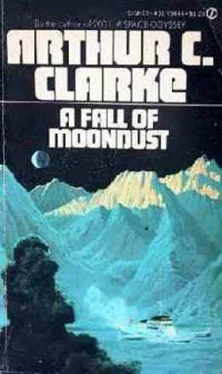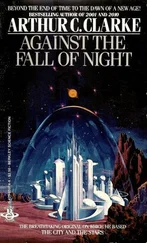Arthur Clarke - A Fall of Moondust
Здесь есть возможность читать онлайн «Arthur Clarke - A Fall of Moondust» весь текст электронной книги совершенно бесплатно (целиком полную версию без сокращений). В некоторых случаях можно слушать аудио, скачать через торрент в формате fb2 и присутствует краткое содержание. Жанр: Фантастика и фэнтези, на английском языке. Описание произведения, (предисловие) а так же отзывы посетителей доступны на портале библиотеки ЛибКат.
- Название:A Fall of Moondust
- Автор:
- Жанр:
- Год:неизвестен
- ISBN:нет данных
- Рейтинг книги:5 / 5. Голосов: 1
-
Избранное:Добавить в избранное
- Отзывы:
-
Ваша оценка:
- 100
- 1
- 2
- 3
- 4
- 5
A Fall of Moondust: краткое содержание, описание и аннотация
Предлагаем к чтению аннотацию, описание, краткое содержание или предисловие (зависит от того, что написал сам автор книги «A Fall of Moondust»). Если вы не нашли необходимую информацию о книге — напишите в комментариях, мы постараемся отыскать её.
A Fall of Moondust — читать онлайн бесплатно полную книгу (весь текст) целиком
Ниже представлен текст книги, разбитый по страницам. Система сохранения места последней прочитанной страницы, позволяет с удобством читать онлайн бесплатно книгу «A Fall of Moondust», без необходимости каждый раз заново искать на чём Вы остановились. Поставьте закладку, и сможете в любой момент перейти на страницу, на которой закончили чтение.
Интервал:
Закладка:
So it went on, point by point. The greatest danger, Lawrence knew, was that his men would get in each other's way as they worked in this confined space. A single trifling accident, and the whole effort would be wasted. One of Lawrence 's private fears, which had been worrying him ever since they left Port Roris, was that some vital tool had been left behind. And there was an even worse nightmare — that the twenty-two men and women in Selene might die within minutes of rescue because the only wrench that could make the final connection had been dropped overboard.
On the Mountains of Inaccessibility, Maurice Spenser was staring through his binoculars and listening to the radio voices calling across the Sea of Thirst. Every ten minutes Lawrence would speak to Selene, and each time the pause before the reply would be a little longer. But Harris and McKenzie were still clinging to consciousness, thanks to sheer will power and, presumably, the musical encouragement they were getting from Clavius City.
“What's that psychologist disc jockey pumping into them now?” asked Spenser. On the other side of the control cabin, the ship's Radio Officer turned up the volume, and the Valkyries rode above the Mountains of Inaccessibility.
“I don't believe”, grumbled Captain Anson, “that they've played anything later than the nineteenth century.”
“Oh yes they have”, corrected Jules Braques, as he made some infinitesimal adjustment to his camera. “They did Khachaturian's 'Sabre Dance' just now. That's only a hundred years old.”
“Time for Duster One to call again”, said the Radio Officer. The cabin became instantly silent.
Right on the second, the dust-ski signal came in. The expedition was now so close that Auriga could receive it directly, without benefit of the relay from Lagrange.
“Lawrence calling Selene. We'll be over you in ten minutes. Are you O. K.?”
Again that agonizing pause; this time it lasted almost five seconds. Then:
“Selene answering. No change here.”
That was all. Pat Harris was not wasting his remaining breath.
“Ten minutes”, said Spenser. “They should be in sight now. Anything on the screen?”
“Not yet”, answered Jules, zooming out to the horizon and panning slowly along its empty arc. There was nothing above it but the black night of space.
The Moon, thought Jules, certainly presented some headaches to the cameraman. Everything was soot or whitewash; there were no nice, soft half tones. And, of course, there was that eternal dilemma of the stars, though that was an aesthetic problem, rather than a technical one.
The public expected to see stars in the lunar sky even during the daytime, because they were there. But the fact was that the human eye could not normally see them; during the day, the eye was so desensitized by the glare that the sky appeared an empty, absolute black. If you wanted to see the stars, you had to look for them through blinkers that cut off all other light; then your pupils would slowly expand, and one by one the stars would come out until they filled the field of view. But as soon as you looked at anything else — phut, out they went. The human eye could look at the daylight stars, or the daylight landscape; it could never see both at once.
But the TV camera could, if desired, and some directors preferred it to do so. Others argued that this falsified reality. It was one of those problems that had no correct answer. Jules sided with the realists, and kept the star gate circuit switched off unless the studio asked for it.
At any moment, he would have some action for Earth. Already the news networks had taken flashes — general views of the mountains, slow pans across the Sea, close-ups of that lonely marker sticking through the dust. But before long, and perhaps for hours on end, his camera might well be the eyes of several billion people. This feature was either going to be a bust, or the biggest story of the year.
He fingered the talisman in his pocket. Jules Braques, Member of the Society of Motion Picture and Television Engineers, would have been displeased had anyone accused him of carrying a lucky charm. On the other hand, he would have been very hard put to explain why he never brought out his little toy until the story he was covering was safely on the air.
“Here they are!” yelled Spenser, his voice revealing the strain under which he had been laboring. He lowered his binoculars and glanced at the camera. “You're too far off to the right!”
Jules was already panning. On the monitor screen, the geometrical smoothness of the far horizon had been broken at last; two tiny, twinkling stars had appeared on that perfect arc dividing Sea and space. The dust-skis were coming up over the face of the Moon.
Even with the longest focus of the zoom lens, they looked small and distant. That was the way Jules wanted it; he was anxious to give the impression of loneliness, emptiness. He shot a quick glance at the ship's main screen, now tuned to the Interplanet channel. Yes, they were carrying him.
He reached into his pocket, pulled out a small diary, and laid it on top of the camera. He lifted the cover, which locked into position just short of the vertical — and immediately became alive with color and movement. At the same time a faint gnat-sized voice started to tell him that this was a special program of the Interplanet News Service, Channel One Oh Seven — and We Will Now Be Taking You Over to the Moon.
On the tiny screen was the picture he was seeing directly on his monitor. No — not quite the same picture. This was the one he had captured two and a half seconds ago; he was looking that far into the past. In those two and a halt million microseconds — to change to the time scale of the electronic engineer — this scene had undergone many adventures and transformations. From his camera it had been piped to Auriga's transmitter, and beamed straight up to Lagrange, fifty thousand kilometers overhead. There it had been snatched out of space, boosted a few hundred times, and sped Earthward to be caught by one or another of the satellite relays. Then down through the ionosphere — that last hundred kilometers the hardest of all — to the Interplanet Building, where its adventures really began, as it joined the ceaseless flood of sounds and sights and electrical impulses which informed and amused a substantial fraction of the human race.
And here it was again, after passing through the hands of program directors and special-effects departments and engineering assistants — right back where it started, broadcast over the whole of Earthside from the high-power transmitter on Lagrange II, and over the whole of Farside from Lagrange I. To span the single hand's breadth from Jules's TV camera to his pocket-diary receiver, that image had traveled three quarters of a million kilometers.
He wondered if it was worth the trouble. Men had been wondering that ever since television was invented.
CHAPTER 21
Lawrence spotted Auriga while he was still fifteen kilometers away; he could scarcely have failed to do so, for she was a conspicuous object, as the sunlight glistened from her plastic and metal.
What the devil's that? he asked himself, and answered the question at once. It was obviously a ship, and he remembered hearing vague rumors that some news network had chartered a flight to the mountains. That was not his business, though at one time he himself had looked into the question of landing equipment there, to cut out this tedious haul across the Sea. Unfortunately, the plan wouldn't work. There was no safe landing point within five hundred meters of Sea level; the ledge that had been so convenient for Spenser was at too great an altitude to be of use.
The Chief Engineer was not sure that he liked the idea of having his every move watched by long-focus lenses up in the hills — not that there was anything he could do about it. He had already vetoed an attempt to put a camera on his ski — to the enormous relief, though Lawrence did not know it, of Interplanet News, and the extreme frustration of the other services. Then he realized that it might well be useful having a ship only a few kilometers away. It would provide an additional information channel, and perhaps they could utilize its services in some other way. It might even provide hospitality until the igloos could be ferried out.
Читать дальшеИнтервал:
Закладка:
Похожие книги на «A Fall of Moondust»
Представляем Вашему вниманию похожие книги на «A Fall of Moondust» списком для выбора. Мы отобрали схожую по названию и смыслу литературу в надежде предоставить читателям больше вариантов отыскать новые, интересные, ещё непрочитанные произведения.
Обсуждение, отзывы о книге «A Fall of Moondust» и просто собственные мнения читателей. Оставьте ваши комментарии, напишите, что Вы думаете о произведении, его смысле или главных героях. Укажите что конкретно понравилось, а что нет, и почему Вы так считаете.












